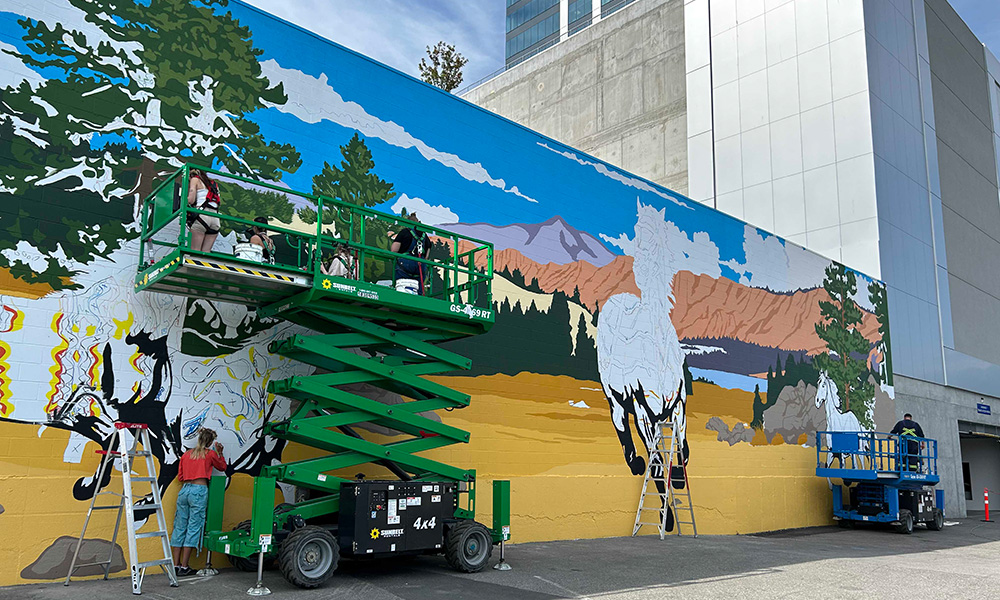
UBCO’s Visual Arts students have been working on a mural at the Landmark District all summer. This is the largest mural yet for the Public Art Project and it will be unveiled at a celebration Thursday afternoon.

UBCO’s Visual Arts students have been working on a mural at the Landmark District all summer. This is the largest mural yet for the Public Art Project and it will be unveiled at a celebration Thursday afternoon.
Posted in Uncategorized

A new mural on the corner of Pandosy Street and West Avenue in Kelowna will be unveiled on June 23.
Posted in Our Students, Uncategorized
What: Nobel Night panel discussion with distinguished professors
Who: University researchers discuss the 2020 Nobel Prizes
When: Thursday, December 10, beginning at 7 p.m.
Where: Virtual event on Zoom. Register at NobelNight.ok.ubc.ca
This year, the long-established tradition of Nobel Night at UBC Okanagan will continue, but in a virtual format. The event will be divided into two segments with the main presentation taking place from 7 to 8 p.m. followed by a moderated question and answer session with the panel.
Each presenter has just eight minutes to explain the significance of the work achieved by this year’s winners. The event will be hosted by UBCO’s Deputy Vice-Chancellor and Principal Lesley Cormack and emceed by Phil Barker, vice-principal and associate vice-president of research and innovation.
The Nobel Prize in Physics:
Alex Hill, assistant professor of astrophysics with the Irving K. Barber Faculty of Science, will highlight the research and findings on black holes conducted by Nobel Prize winners Roger Penrose, Reinhard Genzel and Andrea Ghez.
The Nobel Prize in Chemistry:
Irving K. Barber Faculty of Science’s Kirsten Wolthers, who teaches biochemistry, chemistry and molecular biology, will discuss the findings of Emmanuelle Charpentier and Jennifer Doudna and their development of a method to edit genomes.
The Nobel Prize in Physiology/Medicine:
Sarah Brears, regional associate dean of UBCO’s Southern Medical Program will discuss the work of Harvey J. Alter, Michael Houghton and Charles M. Rice—all three share the prize for their work on the hepatitis C virus including new tests and medicines that can save lives.
The Nobel Peace Prize:
Professor Haroon Akram-Lodhi, editor-in-Chief with the Canadian Journal of Development Studies will speak about significant of the World Food Programme being named the winner of the 2020 Nobel Peace Prize.
The Nobel Prize in Literature:
Nancy Holmes, associate professor of creative studies and creative writing will talk about poet Louise Glück and her award-winning writing.
Advance registration is required to join this virtual event. Register at NobelNight.ok.ubc.ca
UBC’s Okanagan campus is an innovative hub for research and learning founded in 2005 in partnership with local Indigenous peoples, the Syilx Okanagan Nation, in whose territory the campus resides. As part of UBC—ranked among the world’s top 20 public universities—the Okanagan campus combines a globally recognized UBC education with a tight-knit and entrepreneurial community that welcomes students and faculty from around the world in British Columbia’s stunning Okanagan Valley.
To find out more, visit: ok.ubc.ca
Posted in Uncategorized
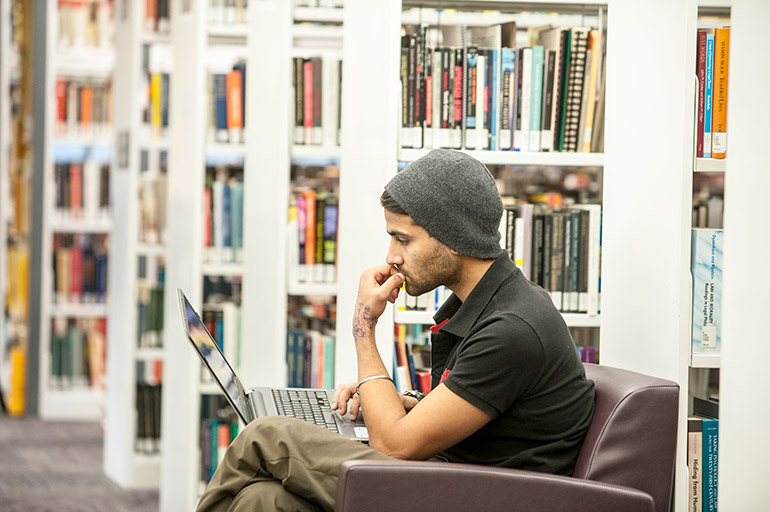
Currently accepting students for the 2021 academic year, the newly structured BA is designed to be responsive to students’ needs and to focus on learning in areas that are important for industry when hiring graduates.
In an era when there’s increasing emphasis on students to focus on science, technology, engineering and math—the STEM fields—UBC’s Okanagan campus is relaunching its Bachelor of Arts (BA) degree with an eye to making it even more relevant to today’s changing world.
Currently accepting students for the 2021 academic year, the newly structured BA is designed to be responsive to students’ needs and to focus on learning in areas that are important for industry when hiring graduates. These include communications, critical thinking, scientific and numeric literacy, and Indigenous understanding.
“We’ve done away with the idea of so-called ‘breadth requirements’ in favour of teaching the core skills that employers are clearly looking for,” says Bryce Traister, dean of the Faculty of Creative and Critical Studies and acting dean of the Irving K. Barber Faculty of Arts and Social Sciences at UBC Okanagan—the two faculties that are together offering the new degree.
Traister points to the Indigenous content requirement in particular as an example how the new program is adapting and preparing the newest generation of graduates to grapple with some of the most important issues facing society.
“By introducing an Indigenous studies requirement, UBCO is joining a small handful of universities in Canada working to realize the promise of Canada’s Truth and Reconciliation Commission process through education—an important step in creating lasting change for our communities,” says Traister. “Not only do we have a moral imperative to explore and teach these ideas, but the jobs of today and those of tomorrow are going to depend on a workforce with a deep understanding and fulsome appreciation for them.”
But Traister is quick to point out that Indigenous content is just one element of the new BA program. With a long list of courses on offer that he says didn’t exist 20 years ago, students today will benefit from the variety, flexibility and choice that will make their degree more relevant than ever.
“Take a full BA in gender and sexuality studies or race and cultural studies, for example,” he says. “These weren’t available just a generation ago but it’s hard to imagine a subject area more relevant to the working conditions of women and men today, or to our collective engagement with racial inequality and justice.”
While Traister says that the STEM fields are equally important to addressing society’s challenges, it’s when science and engineering are combined with the arts and humanities that humanity can reach its full potential.
“UBCO’s Bachelor of Arts degree has been rethought to do exactly that,” he adds. “Graduates will be taught to think critically and creatively, to learn from the past and re-imagine the future—better, greener, safer and more just.”
“There’s never been a more exciting time to pursue a degree in the liberal arts.”
UBC’s Okanagan campus is an innovative hub for research and learning founded in 2005 in partnership with local Indigenous peoples, the Syilx Okanagan Nation, in whose territory the campus resides. As part of UBC—ranked among the world’s top 20 public universities—the Okanagan campus combines a globally recognized UBC education with a tight-knit and entrepreneurial community that welcomes students and faculty from around the world in British Columbia’s stunning Okanagan Valley.
To find out more, visit: ok.ubc.ca
Posted in Media Releases, Spotlight
What: Sharon Thesen Lecture
Who: UBCO Creative Writing Program
When: Thursday, November 19 at 7 p.m.
Where: Online via Zoom
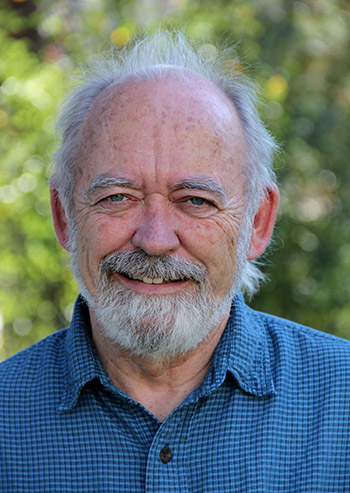
UBCO is hosting its inaugural Sharon Thesen Lecture with Vernon-based author John Lent.
The creative writing program at UBCO is hosting its inaugural Sharon Thesen Lecture with Vernon-based author John Lent. Lent, a professional writer, editor, singer and songwriter, will give a virtual talk titled, Aspects of Poetics in Contemporary Fiction and Poetry: a practical logic of legacies, a working arc of continuance. His presentation is based on a writer’s and teacher’s journey through the power and promise of modernism and the teaching of creative writing.
Sharon Thesen, a renowned Canadian poet and editor, was the first full professor in the department of creative studies and is now a UBC professor emerita.
“The UBC creative writing program wants to honour all that she contributes to British Columbian and Canadian literature, and all that she did to establish the creative writing program at UBC Okanagan,” explains Faculty of Creative and Critical Studies Professor Nancy Holmes. “In her honour, a different writer each year will give a lecture that tackles key issues of contemporary writing, poetics and Canadian literature. By recording each lecture, we will create a wonderful resource of contemporary thinking by writers.”
Lent has taught creative writing and literature courses at Okanagan College for over 30 years. He has published 11 books and edited 35 volumes of poetry, fiction and non-fiction for publication. His latest publication, A Matins Flywheel, is a book of poetry.
“John is a terrific writer, a master teacher of fiction and poetry, an in-demand editor and someone who pretty single-handedly created the contemporary literary culture in the Okanagan,” says Holmes. “We are honoured to have him as the first lecturer in our Sharon Thesen series.”
The lecture is free and open to the public. It will take place on November 19 starting at 7 p.m.
For further information, visit fccs.ok.ubc.ca/visiting-author
UBC’s Okanagan campus is an innovative hub for research and learning founded in 2005 in partnership with local Indigenous peoples, the Syilx Okanagan Nation, in whose territory the campus resides. As part of UBC—ranked among the world’s top 20 public universities—the Okanagan campus combines a globally recognized UBC education with a tight-knit and entrepreneurial community that welcomes students and faculty from around the world in British Columbia’s stunning Okanagan Valley.
To find out more, visit: ok.ubc.ca
Posted in Creative Studies, Media Releases
Kim Senklip Harvey, a director, playwright and actor, is this fall’s writer in residence with the creative writing program at UBC Okanagan. In service to the community, she is currently accepting writing samples from the public and will be holding one-on-one virtual meetings from October 13 to 23 to discuss their work, the writing process and writing and storytelling concerns.
The writer in residence program promotes Canadian writing and literature to Okanagan residents and provides emerging writers an opportunity to get feedback on their creative work, explains Faculty of Creative and Critical Studies Professor Nancy Holmes.
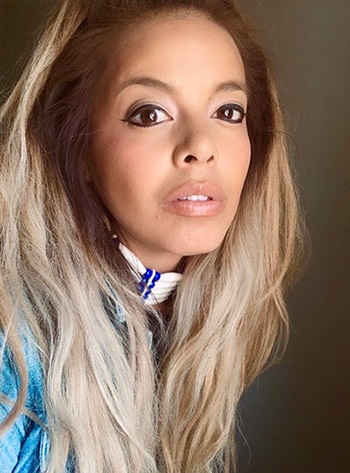
Kim Senklip Harvey, is this fall’s writer in residence with the creative writing program at UBC Okanagan
Harvey is a Syilx, Tsilhqot’in, Ktunaxa and Dakelh nation’s woman and has worked on many projects all across Turtle Island, including the national tour of Where the Blood Mixes, Gordon Tootoosis final show Gordon Winter and the world premiere of Children of God. Her play Kamloopa was awarded the Jessie Richardson award of Significant Artistic Achievement for Decolonizing Theatre Practices and Spaces and in 2019 it was published as a book.
“Kim is an exciting, dynamic, up-and-coming playwright, whose play, Kamloopa: An Indigenous Matriarch Story, is as funny as it is profound,” says Anne Flemming, professor of creative writing at UBC Okanagan. “Her transformative work has a great energy that I’m excited for our students and the wider community to get to know.”
Flemming adds that as someone of Syilx, Tsilhqot’in, Ktunaxa and Dakelh heritage, Harvey has a strong connection to the Okanagan.
“It just makes sense for the local community to celebrate her work and learn from her,” she says.
Harvey will be giving a free virtual talk Interior Salish Sharing: Stories from a Shapeshifter on Tuesday, October 20 at 7 p.m. In her presentation, she will share the prose, plays, process of dismantling and troubling colonial and neo-capital systems, and the resurgence of Indigenous Matriarchal led systems and frameworks. She will place a particular focus on amplifying the emancipatory journeys of those enduring state oppressions.
“I’ve been listening to her podcast for some time and she’s a deeply innovative and profound thinker,” says Flemming. “I’m looking forward to hearing her talk and to have her part of UBCO.”
While in residence, Harvey will read and offer feedback on the manuscripts of local writers. Writers are invited to submit their manuscripts for Harvey’s review. The deadline for submissions is Thursday, October 8.
For further information, visit: fccs.ok.ubc.ca/about/events-workshops/authors
UBC’s Okanagan campus is an innovative hub for research and learning founded in 2005 in partnership with local Indigenous peoples, the Syilx Okanagan Nation, in whose territory the campus resides. As part of UBC—ranked among the world’s top 20 public universities—the Okanagan campus combines a globally recognized UBC education with a tight-knit and entrepreneurial community that welcomes students and faculty from around the world in British Columbia’s stunning Okanagan Valley.
To find out more, visit: ok.ubc.ca
Posted in Media Releases
Countries around the world, including Canada, are working to contain the current outbreak of the coronavirus disease (COVID-19).
Posted in Spotlight
Professor Alison Conway
English and Cultural Studies, Gender and Women’s Studies
Phone: 250 807 9701
Email: alison.conway@ubc.ca
Research Interests: Woman’s literature; literary and cultural history of the long eighteenth century in Britain; narrative studies; and gender and sexuality theory.
Professor Sue Frohlick
Anthropology, Gender and Women’s Studies
Phone: 250 807 8525
Email: susan.frohlick@ubc.ca
Research Interests: Mobility, subjectivity, space, gender, and sexuality; transnational intimacies; immigration; tourism and travel; youth and youthhood; community-based research; urban and transnational anthropology; heterosexuality; ethnography.
Associate Professor Suzanne Gott
Art History, Creative Studies, Gender and Women’s Studies
Phone: 250 807 9671
Email: suzanne.gott@ubc.ca
Research Interests: Exploring issues of gender, comparative aesthetics, display, and performance; investigating continuities and/or transformations of precolonial art and aesthetics in colonial, postcolonial, and contemporary art and visual culture.
Assistant Professor Heather Latimer
Gender and Women’s Studies
Phone: 250 807 8153
Email: heather.latimer@ubc.ca
Research Interests: Reproductive technologies and politics, especially reproductive futurism; biopolitics; sexuality studies; science and technology studies; feminist new materialism and post-humanism; cultural studies; literature and film.
Associate Professor Ilya Parkins
Gender and Women’s Studies
Phone: 250 807 9625
Email: ilya.parkns@ubc.ca
Research Interests: Feminist theories, especially epistemologies; history and theory of fashion; theories of modernity and early twentieth-century cultural formations; femininities; periodical media.
Associate Professor Margaret Reeves
English and Cultural Studies; Gender and Women’s Studies
Phone: 250 807 9639
Email: margaret.reeves@ubc.ca
Research Interests: Early modern women’s writing; children’s literary cultures (early modern to contemporary); early modern childhood and youth; Milton and early modern political theory; satiric fiction; women’s literature; Medieval and Renaissance studies; 16th- and 17th-century literature; history of the novel; auto/biographical discourse; speculative fiction; feminist and queer theory.
UBC’s Okanagan campus is an innovative hub for research and learning founded in 2005 in partnership with local Indigenous peoples, the Syilx Okanagan Nation, in whose territory the campus resides. As part of UBC—ranked among the world’s top 20 public universities—the Okanagan campus combines a globally recognized UBC education with a tight-knit and entrepreneurial community that welcomes students and faculty from around the world in British Columbia’s stunning Okanagan Valley.
To find out more, visit: ok.ubc.ca
Posted in Uncategorized
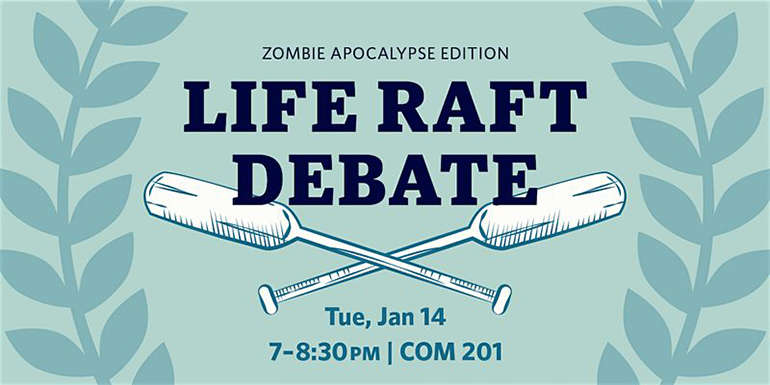
What: Life Raft Debate
Who: UBC professors debate their expertise during fictional zombie apocalypse
When: Tuesday, January 14, beginning at 7 p.m.,
Where: Room COM 201, The Commons building, 3297 University Way, UBC Okanagan, Kelowna
For many, the question of who to bring along in order to rebuild human civilization during a zombie apocalypse has gone unanswered for too long. Now, six UBC Okanagan professors, all from different fields of expertise, aim to settle the issue once and for all—or at least until next year—as they prepare for the second annual Life Raft Debate.
For event organizer and chemistry undergraduate student Jesse Lafontaine, the premise of the debate is simple. The audience is the last of humanity to survive a zombie apocalypse and there’s only one seat left in their life raft. Which UBC expert should they pick to join them and why?
“The concept is definitely absurd,” jokes Lafontaine. “But it’s also refreshing and entertaining to hear very accomplished UBC professors explain their expertise and argue how their work would help human civilization recover from such an unlikely disaster.”
Lafontaine adds that the lighthearted nature of the debate is what makes it so compelling while at the same time helps translate complex areas of study into something fun and accessible to everyone.
Stephen McNeil, chemistry professor and Life Raft Debate defending champion, agrees.
“As university professors, we’re used to speaking to students who are already interested in our fields of study,” says McNeil. “Defending the power of chemistry to a room full of people who probably aren’t as passionate as I am about organometallic reaction mechanisms is certainly humbling.”
He adds that offering this unique twist on academic debate is a great way to help people discover how different points of view and areas of expertise each make essential contributions to human society.
“Medicine keeps us healthy. Engineering builds the tools we need to survive. Anthropology understands how other cultures survive and thrive. Art is what makes us human in the first place,” he says. “It’s difficult to defend and advocate for just one.”
Lafontaine is quick to point out that the debate lineup is more than up to the task.
“We have heavy hitters from our campus this year,” says Lafontaine. “They include, among others, the director of the School of Engineering, who is a formidable engineer and researcher; the dean of the Faculty of Creative and Critical Studies, whose eloquence is unmatched; and the Deputy Vice-Chancellor and Principal of UBCO, who has been in charge of our campus for the last eight years and definitely knows how to win an argument.”
The list of debate participants also includes the role of ‘devil’s advocate’, whose job is to argue that none of the experts deserve a spot on the life raft.
While the topic may be lighthearted, Lafontaine says the debate is classically structured and the participants will make their arguments in earnest, with the audience voting on the winner.
McNeil is returning to defend his title. The key, he says, is communicating to as broad an audience as possible.
“I’ve been interested in science outreach for a long time,” he says. “But even with that experience, distilling the accomplishments and capabilities of the whole field of chemistry into a five-minute defense is no easy task.”
“My winning argument was that, as a chemist, I know how to take simple molecules and manipulate them into creating something new, like penicillin or steel. But now that we not only need to rebuild civilization but also survive a zombie hoard, I may need to up my game this year.”
The Life Raft Debate takes place on January 14, at 7 p.m. in the Commons lecture theatre at UBC Okanagan. The event is free and open to the public but registration is required at: https://students.ok.ubc.ca/life-raft-debate/
UBC’s Okanagan campus is an innovative hub for research and learning in the heart of British Columbia’s stunning Okanagan Valley. Ranked among the top 20 public universities in the world, UBC is home to bold thinking and discoveries that make a difference. Established in 2005, the Okanagan campus combines a globally recognized UBC education with a tight-knit and entrepreneurial community that welcomes students and faculty from around the world.
To find out more, visit: ok.ubc.ca
Posted in Uncategorized
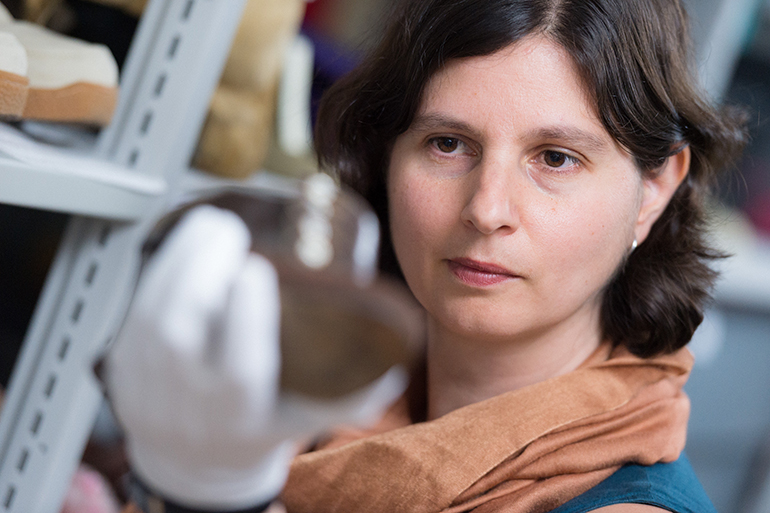
Associate Professor of History Brigitte Le Normand is the academic director of UBCO’s public humanities hub.
In an era when divisions in society seem more prevalent than ever, two UBC humanities professors are using the power of arts, history and philosophy to build bridges and address the world’s most pressing issues.
UBC is putting a spotlight on the human side of research through the creation of a public humanities hub on both the Vancouver and Okanagan campuses. Associate Professor Brigitte Le Normand, director of the Okanagan hub, says this initiative is designed to bring the university’s brightest thinkers from the humanities together to explore emerging public policy questions.
“We’re faced with a number of critical problems and we have a tendency to turn to scientists and engineers for the answer,” says Le Normand. “Technology certainly has a lot to contribute, but humanists can step in by asking how can we even frame the problems in the first place and how does that shape the solutions we develop.”
Le Normand, a history professor, says research from the Public Humanities Hub will be interdisciplinary, bridging connections in faculties across both campuses. While it supports UBC’s research culture it will also publicize and organize humanities research and amplify the work of humanists on the Okanagan campus.
Adding critical thinking and reasonable voices to those solutions is part of the humanities mandate, says Greg Garrard, a professor of environmental humanities at UBCO. There is a need for different voices when it comes to research and problem solving, he says. Sometimes adding a humanist voice to the conversation can help change hearts and minds on issues that can polarize society.
“We might turn to technology to solve our issues but it may be that technological solutions are not the best for addressing the problem,” says Garrard. “Perhaps the problem is bigger than that and you need to find an opening for other kinds of conversation. This is a great example of where humanists can step in and change the terms of the discussion.”
While there are specific pillars of interest the hub will focus on—medical ethics, the environment, digital humanities and public history—both Garrard and Le Normand cite several examples of everyday situations where humanities can play a significant role in scientific conversations and resolutions including medically assisted death, justice by social media and climate change.
“One of the biggest challenges of our day is the climate emergency,” she says. “It’s polarizing and that very polarization prevents us from addressing problems. If you can step around that inherent conflict, you can change the very terms of the conversation. Suddenly the doors open for a productive conversation that didn’t previously exist.”
Over the next year, the Okanagan public humanities hub will host a speaker series, inviting the public to learn from experts about a number of topics. There are also plans for a conference in July where the researchers will highlight some of the work taking place at UBC. More information about the hub can be found at: public-humanities.cms.ok.ubc.ca
UBC’s Okanagan campus is an innovative hub for research and learning in the heart of British Columbia’s stunning Okanagan Valley. Ranked among the top 20 public universities in the world, UBC is home to bold thinking and discoveries that make a difference. Established in 2005, the Okanagan campus combines a globally recognized UBC education with a tight-knit and entrepreneurial community that welcomes students and faculty from around the world.
To find out more, visit: ok.ubc.ca
Posted in Media Releases, Research & Teaching